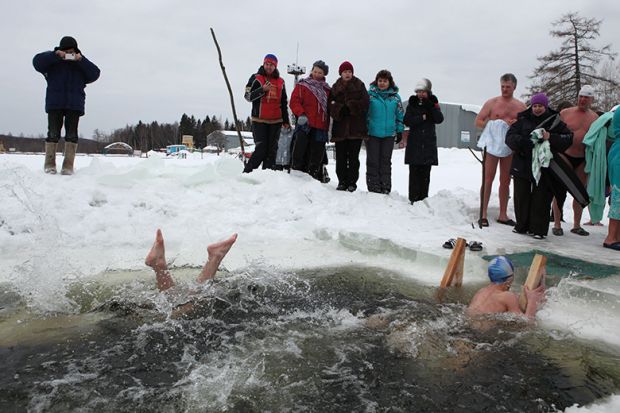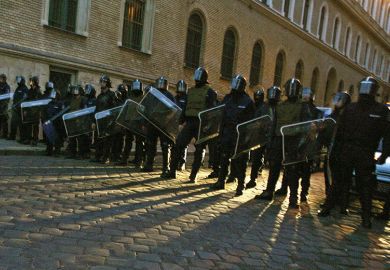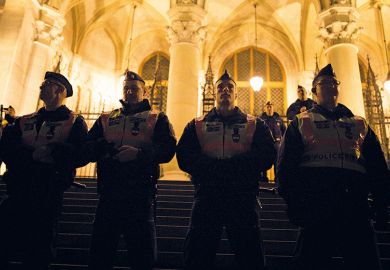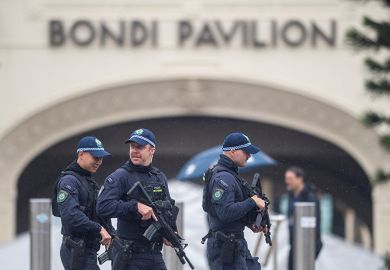Russia’s “European” university is contemplating a future as a research-only institution after the latest twist in a long-running battle with the country’s authorities saw its application for a new teaching licence rejected.
The European University at St Petersburg, a private postgraduate institution, has been wrangling with the government since last year, when it endured a series of snap inspections by authorities and had its teaching licence suspended.
Officials claimed that EUSP, which has just 250 students and offers courses in the social sciences and humanities, had violated up to 120 rules and regulations. Infractions included not possessing its own gym (the university rents one in a different building) and lacking stands displaying anti-alcohol messages.
However, the university said that the inspections were instigated by an official complaint from Vitaly Milonov, a member of the Russian parliament for Vladimir Putin’s United Russia Party, who expressed concern about the teaching of gender studies at the institution.
“I personally find that disgusting, it’s fake studies, and it may well be illegal,” Mr Milonov told the Christian Science Monitor.
Since then, the university has been attempting to obtain a new licence, but its latest application was rejected at the end of September. In a statement on its website, EUSP said that “the results of the [building] inspection are divorced from reality and do not elaborate on the substance of the violations”. It added that the university was preparing a new licence application.
But Oleg Kharkhordin, professor in the department of political science and sociology, who stepped down as the institution’s rector in June, told Times Higher Education that it was now “highly unlikely” that EUSP would be able to teach current students or admit new ones during the 2017-18 academic year. Universities are required by law to begin the new term by 1 November.
“It means that we would just be reduced to a function of a research institution; we can do public outreach lectures but we cannot teach regular students,” he said. “The main people who will suffer are the current students who were in their second year of study for a PhD.”
However, the removal of the teaching licence is already causing issues around research funding.
As a private institution, the university is funded largely by “major private donations from Russian businessmen”, some of whom are now questioning the value of donating to a university that cannot teach, according to Professor Kharkhordin.
“Some private donors are saying that they were funding the students rather than anything else, that they would like to see young people develop into top leaders in science,” he said. “Some donors have suspended their funding until we are reinstated with our licence.”
Professor Kharkhordin said that he was not aware that any scholars had left the university because of the licence revocation, adding that he thought some academics might “even rejoice” at the prospect of a year spent solely on research.
But he admitted that teaching allows professors to hone their studies.
“With public outreach lectures, we will hopefully not suffer major setbacks [before we regain] a teaching licence and hopefully get our students back next fall,” he said.
Grigorii Golosov, professor of comparative politics at EUSP, said that he was concerned that the government would also try to “stop the research projects” at the institution, although how it might do so is unclear given that universities in Russia are not required to have a research licence.
During the summer, the university was removed from its premises in the Small Marble Palace, one of the most iconic buildings in St Petersburg, but it has since purchased another building for its home.
“The European University was inspected by no less than 10 different government agencies. It was the educational agency that was finally selected by someone to in effect close the educational activities of the European University,” Professor Golosov said.
“But the very systematic and apparently coordinated character of this move suggests that there was something wider beyond this well-organised and efficient attack. So the question is: ‘what was the ultimate purpose?’”
The “ultimate goal”, he said, might be “simply to close down any kind of activities of the European University”.
Despite the concerns, both academics expressed confidence that new students would still apply to the institution if it regains a teaching licence before next September.
Prospective students “understand that if you want to do modern social sciences, which the country needs, there is hardly a better place to do it than at our university”, said Professor Kharkhordin.
POSTSCRIPT:
Print headline: St Petersburg university faces research-only future
Register to continue
Why register?
- Registration is free and only takes a moment
- Once registered, you can read 3 articles a month
- Sign up for our newsletter
Subscribe
Or subscribe for unlimited access to:
- Unlimited access to news, views, insights & reviews
- Digital editions
- Digital access to THE’s university and college rankings analysis
Already registered or a current subscriber?







